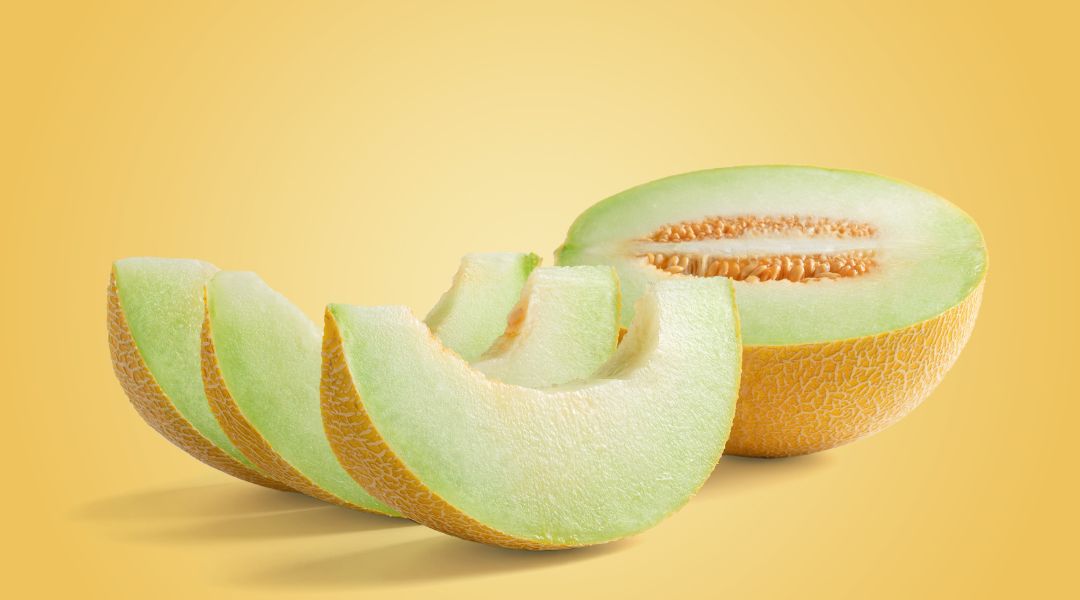- It is a hydrating fruit, providing water and electrolytes to the body
- It contains essential nutrients like collagen, zinc, carotenoids, and potassium, which benefit overall health
- It can help control blood sugar levels and reduce the risk of diabetes-related health problems
- It is rich in nutrients important for bone health, such as folate, vitamin K, and magnesium
- Regular consumption of honeydew melon may help lower blood pressure and reduce the risk of heart disease
Did you already know about the satiating and moisturizing power of honeydew melon?
Well, if you did not know the refreshing power of this wonderful fruit, now is the time.
With just a good piece of this fruit, we will provide a good amount of water and electrolytes to our bodies.
Hence, its refreshing power.
But this fruit does not only provide hydration; it has other health benefits that may surprise you.
Keep reading and discover everything that honeydew melons can offer our bodies.
Physical description
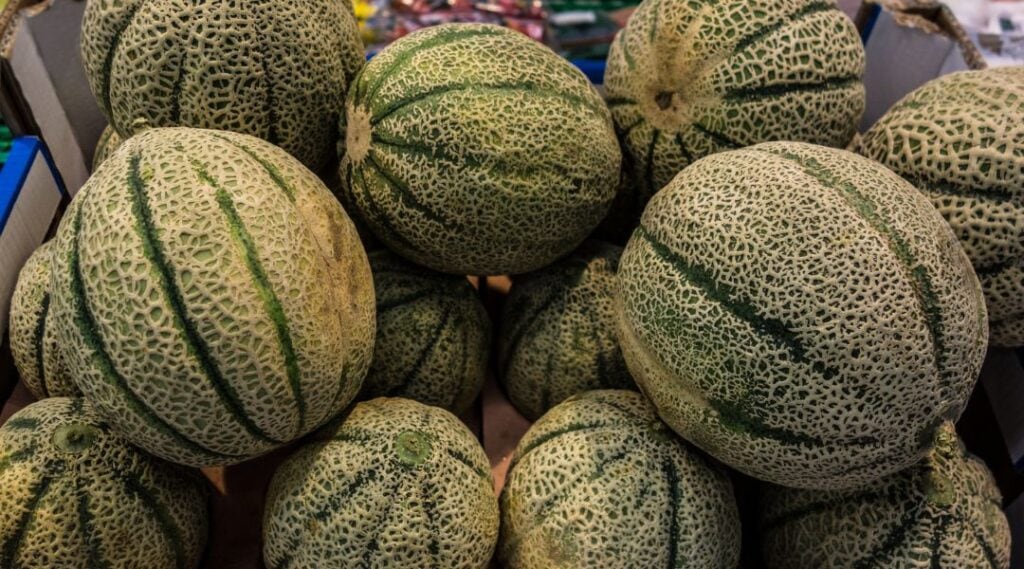
Both the honeydew melon plant and the cantaloupe plant are very similar except for the leaf lobes.
The leaves of the honeydew melon plant are larger than that of the cantaloupe.
The fruit of each plant is slightly different.
A ripe honeydew melon is exceptionally soft, with no webs or ribs on its skin, and is about 8 inches long.
Its shape is spherical and slightly oval.
When the fruit is still young, some small hairs can be seen on its surface.
Its bark is greenish-white but changes to a creamy-yellow hue as it matures.
The pulp is light green, very juicy, sweet, and tasty.
History and production
The Middle East is where most melons come from.
Although the actual origin of honeydew melons is unknown, it is believed to be native to the Middle East or Western Asia.
They have been cultivated in the Middle East since ancient times.
The Egyptians revered them as a sacred delicacy due to their sweet and juicy flavor.
It wasn’t until the late 15th century that honeydews reached Europe.
In countries with colder climates, it was grown inside a greenhouse throughout the winter.
Christopher Columbus was the one who introduced honeydew melon seeds to the United States.
Spanish explorers who brought melon seeds to California contributed to the spread of honeydew melons.
Honeydew melons are grown worldwide, flourishing in sunny, semi-arid areas.
This fruit is produced mainly in China, Turkey, and the United States in California and Arizona.
Also, in Honduras, Costa Rica, Mexico, and Guatemala, honeydew melons are grown to meet demand in the US and European markets.
Thanks to the large number of nutrients and benefits that honeydew melons have, their production has increased over time.
Learn a little about everything that honeydew melons can offer us.
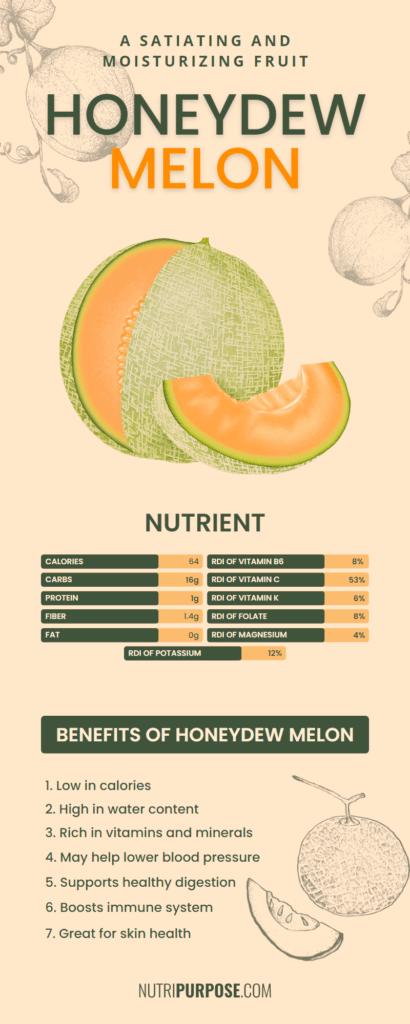
Nutrients of Honeydew melon
The most useful feature of honeydew melon is its varied nutrient content.
Its numerous potential health advantages could be attributed to the diverse nutrients and plant components.
In addition to its refreshing and hydrating properties, honeydew melon is also packed with essential nutrients that can benefit our overall health.
One of the key nutrients found in honeydew melon is collagen, which is a major structural protein in the body that plays a crucial role in maintaining healthy skin, hair, and nails.
Consuming honeydew melon can help support the production of collagen, leading to improved skin elasticity and a more youthful appearance.
Another important nutrient found in honeydew melon is zinc, which is essential for a healthy immune system and proper digestion.
Zinc plays a vital role in the production of enzymes that aid in the digestion and absorption of nutrients.
It also helps to strengthen the immune system, making it more effective at fighting off infections and diseases.
Honeydew melon is also a rich source of carotenoids, such as zeaxanthin, lutein, and beta-carotene.
These carotenoids have antioxidant properties that help protect the body’s cells from damage caused by harmful free radicals.
They also play a role in maintaining healthy vision and reducing the risk of age-related macular degeneration.
Furthermore, honeydew melon is high in potassium, which is an important mineral for maintaining healthy blood pressure levels and supporting proper muscle and nerve function.
Adequate potassium intake can help counteract the negative effects of sodium on blood pressure, reducing the risk of hypertension and cardiovascular disease.
Moreover, honeydew melon has a low glycemic index, which means it doesn’t cause a rapid spike in blood sugar levels.
This makes it a suitable fruit for individuals who need to control their blood sugar, such as those with diabetes or insulin resistance.
The fiber content in honeydew melon also aids in blood sugar control by slowing down the absorption of glucose into the bloodstream.
A serving of honeydew melon weighing 177 grams offers:
- 64 Calories
- 1.4 grams of Fiber
- 16 grams of Carbs
- 0 grams of Fat
- 1 gram of Protein
- 8% of the reference daily intake (RDI) of Vitamin B6
- 53% of RDI of Vitamin C
- 6% of the RDI of Vitamin K
- 8% of the RDI of Folate
- 4% of the RDI of Magnesium
- 12% of the RDI of Potassium
Beta-carotene (pro-vitamin A), phytoene, quercetin, and caffeic acid are additional substances found in the honeydew melon fruit. Also, the seeds have excellent antioxidant properties.
health benefits of Honeydew melon
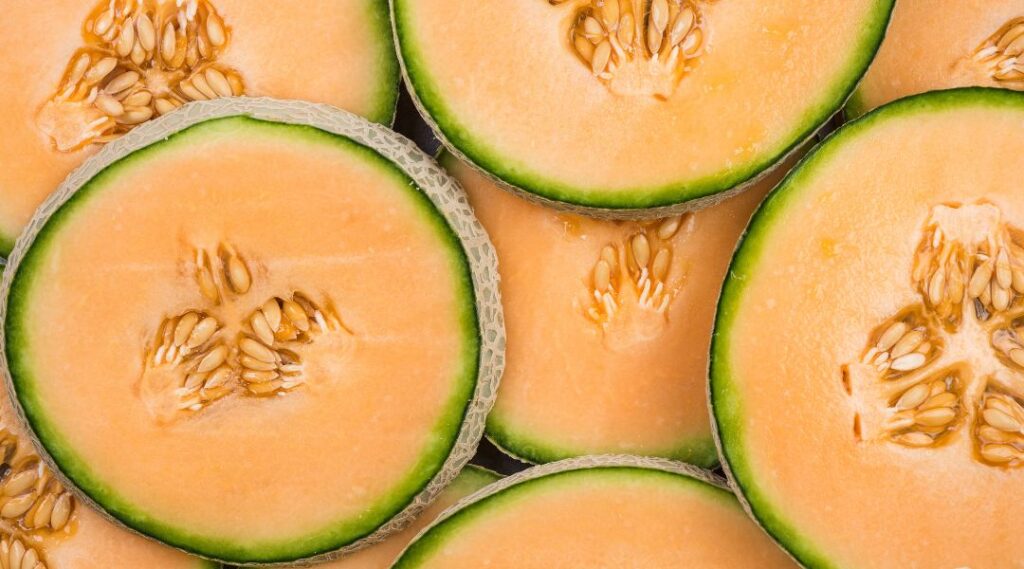
Rich Source in Water and Electrolytes
Water is the first item that usually comes to mind when we consider hydration.
However, it also needs electrolytes for our body to hydrate efficiently and effectively.
The water content of a honeydew melon is around 90%.
It also contains electrolytes, including potassium, magnesium, sodium, and calcium.
Honeydew melon is a fantastic way to hydrate after exercise or during illness.
It’s also a great option for simply staying hydrated throughout the day.
Help Controlling Blood Sugar
Some studies suggest that frequent consumption of fruits such as honeydew melon can help maintain healthy blood sugar levels.
A study on adults concluded that those who ate fruit regularly had a 12% lower risk of developing diabetes.
Eating fruit at least thrice a week reduced the risk of diabetes-related health problems by 13-28%.
It also lowered the chance of premature death by 17% in people with diabetes.
Although honeydew melon contains carbohydrates that momentarily spike blood sugar, it also offers fiber and other nutrients.
These could help control blood sugar in the long term.
Has Nutrients Important for Bone Health
Folate, vitamin K, and magnesium are among the elements found in honeydew melon.
These are essential for building and maintaining strong bones.
Honeydew melon is an excellent source of folic acid; with 1 cup (177 grams), we can get 8% of the RDI.
Homocysteine is a sulfur amino acid that is broken down by folate.
Higher levels of this compound have been associated with a gradual decrease in bone mineral density.
Although the connection between folate and bone health is a subject of study, eating foods rich in folate promotes strong bones.
This is because folate helps keep homocysteine levels within the recommended range.
Consuming one serving of honeydew melon provides 6% of the RDI for vitamin K.
Osteocalcin, a crucial structural protein in bones, is produced with the help of vitamin K.
Therefore, a sufficient intake of vitamin K is necessary to have strong bones.
We can also find vitamin K in spinach, avocados, asparagus, and broccoli.
A serving of honeydew melon also provides about 4% of our daily magnesium needs.
Magnesium is necessary for the normal function of cells that create and break down bone structure.
That is why magnesium is another essential nutrient for bone health.
We can also find magnesium in bananas, spinach, and avocados.
Might Lower Blood Pressure
A diet full of fruits and vegetables is generally linked to a lower risk of high blood pressure and heart disease.
Consuming enough potassium and following a low-sodium diet may further help regulate blood pressure.
It is possible that we can maintain good blood pressure levels by eating honeydew melon.
This is a fruit rich in potassium and low in sodium.
A 1-cup (177-gram) meal provides 12% of the RDI for potassium our body needs.
That is why it is recommended to consider including this fruit in our diet.
Now that you know the nutrients and benefits of honeydew melon, you are surely thinking about how to eat it.
Here are some recipes to get you started right away.
Honeydew melon recipes
Margarita melon salad
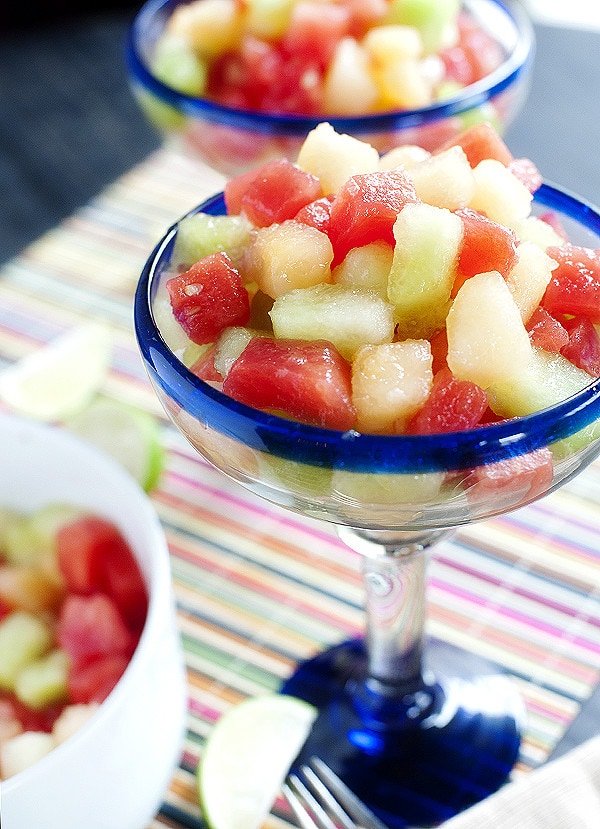
Preparation time: 15 minutes
Serves: 8
Ingredients
- 1 honeydew melon
- 1 cantaloupe
- 1 watermelon
- 2 ounces of orange liquor
- 3 ounces of silver tequila
- 2 limes in juice
Procedure
- Peel, remove the seeds, and cut the 3 types of melons into cubes.
- Put all the fruit in a bowl and add the alcohol and lime juice.
- Chill for a minimum of 6 hours or overnight, then enjoy.
Note: This is an alcohol-based drink,, so keep it away from children.
Smoothie with Honeydew Melon and Kiwi
Preparation time: 5 minutes
Serves: 2
- 2 and 1/2 cups of ice (crushed)
- 1 and 1/2 cups of kiwi (peeled and cut into cubes)
- 2 cups of honeydew melon (peeled, seeded, and cut into cubes)
- 12 large fresh mint leaves
- 1 and 1/2 tablespoons of honey
- 1 and 1/2 tablespoons of fresh lime juice
Preparation
- Blend all ingredients in a blender until they are completely smooth.
- Serve the smoothie by dividing it between two glasses.
Soup with Honeydew Melon and Blueberry

Preparation time: 10 minutes
Serves: 6
Ingredients
- 1 honeydew melon
- 8 cookies of oatmeal
- 20 ounces of blueberries
Procedure
- Remove the skin and cut the melon into slices.
- In a food processor or blender, puree the melon until smooth.
- Mix the melon puree with the blueberries in a large bowl.
- Pour the soup into individual plates and top each plate with chopped oatmeal cookies.
With these recipes, you will love honeydew melons. You will end up thinking the same thing as Barbra Streisand:
“Success to me is having ten honeydew melons and eating only the top half of each one.”
Refresh with a Honeydew Melon
You already know that honeydew melon is a delicious alternative to refresh yourself and recharge nutrients.
In addition to the numerous health benefits, honeydew melon is a versatile fruit that can be enjoyed in various ways.
It can be sliced and eaten on its own as a refreshing snack, added to salads for a burst of sweetness, or blended into smoothies for a nutritious and delicious beverage.
For a unique twist, honeydew melon can also be paired with other fruits like kiwi or blueberries to create a flavorful and nutrient-packed dish.
In conclusion, honeydew melon is not only a delicious and refreshing fruit, but it also offers a wide range of health benefits.
From providing hydration and electrolytes to supporting healthy digestion and immune function, this fruit has it all.
The electrolytes and water it contains will not only keep you hydrated, but it will also nourish you and keep you healthy.
So, next time you’re looking for a healthy and satisfying snack, reach for a ripe honeydew melon and enjoy all the goodness it has to offer.
Try it and enjoy its juicy flavor.

I am a professional health and nutrition writer with extensive experience in the industry. My passion for sharing valuable insights on nutrition and wellness stems from over 15 years of personal training and maintaining a healthy lifestyle. My commitment to continuously educate myself on the latest trends and research in the field allows me to deliver high-quality content that is informative and engaging. My mission is to empower individuals to make informed decisions about their health and well-being through my writing.
